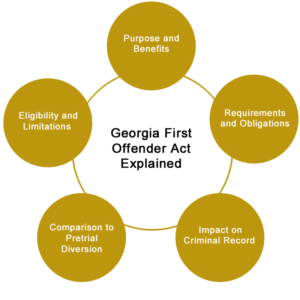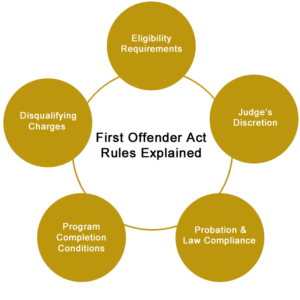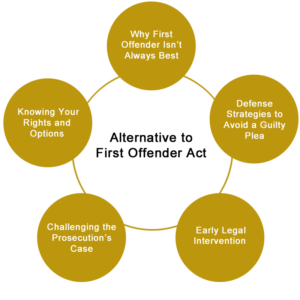 Georgia’s First Offender Act was designed to help people avoid having a criminal conviction on their permanent record by requiring them to fulfill a set of obligations set by the judge. It does not help them avoid punishment; in fact, part of the obligations will include pleading guilty and serving the sentence set by the judge. But upon satisfaction of the judge’s requirements, the defendant’s case will be considered discharged without a conviction, allowing them to avoid issues finding a job, housing or education. Background checks that most employers or creditors would use will not show the conviction, but the court and law enforcement will still be able to access the conviction.
Georgia’s First Offender Act was designed to help people avoid having a criminal conviction on their permanent record by requiring them to fulfill a set of obligations set by the judge. It does not help them avoid punishment; in fact, part of the obligations will include pleading guilty and serving the sentence set by the judge. But upon satisfaction of the judge’s requirements, the defendant’s case will be considered discharged without a conviction, allowing them to avoid issues finding a job, housing or education. Background checks that most employers or creditors would use will not show the conviction, but the court and law enforcement will still be able to access the conviction.
This act differs from pretrial diversion or conditional discharge, two programs with allow the defendant to avoid a conviction or jail time. Pretrial Diversion is not available in every county, but allows first-time offenders to see their charges dismissed with no record of guilt and no guilty plea as long as they fulfill certain obligations including community service, behavior management courses, payment of restitution and maintenance of a clear record. Pretrial Diversion is reserved for first offenders, those facing non-violent charges or lesser offenses such as shop-lifting.
The key difference between Pretrial Diversion and Georgia’s First Offender Act is that lenience under the First Offenders Act requires a guilty plea. Pretrial Diversion does not. While it’s not available for all charges, and is obviously only applicable for first offenders, the First Offender act does allow for a clean criminal record, helping defendant’s safeguard their future.
The First Offender Act in Real Life
Let’s look at a few hypothetical scenarios and how Georgia’s First Offender Act would apply to each. Sam is a 25-year-old audio-video contract with a clean criminal record. Following accusations from his employer of stealing high-end electronics, he is facing charges of Felony Theft by Taking. Working with a defense attorney, Sam pleads guilty under Georgia’s First Offender Act and is sentenced to five years of probation. In addition to avoiding further charges during his probation, Sam is required to pay restitution for the stolen items, attend a theft prevention program, and serve 100 hours of community service. Upon completing his five years, the court discharges Sam’s case and seals his record, allowing him to live without a felony record on his conviction.
Alexa, 25 had never been arrested until one night during a heated argument at a sporting event when her temper got the best of her. Throwing a punch at another attendee, she catches them with a ring that causes a laceration, requiring the victim to get stitches. Because of this, she faces aggravated assault charges, which are considered felony-level charges in Georgia with the potential for serious jail time. Knowing that this is her first offense, and arguing that the incident didn’t involve a weapon or result in life-threatening injuries, her attorney is able to negotiation for sentencing under the First Offender Act. Alexa agrees to three years of probation including anger management courses, community service, and a no-contact order with the victim. As with Sam, when she finally completes the program she is free to move forward without a conviction on her record.
 Understanding the Rules of the First Offender Act
Understanding the Rules of the First Offender Act
As described under Georgia Code O.C.G.A. § 42-8-60, the Georgia First Offender Act allows first-time offenders to avoid having a conviction on their record so long as they first plead guilty and then meet the following criteria:
- Have a clean criminal record, free of any felonies from within Georgia or elsewhere.
- Receive court approval. The judge has the ultimate authority to allow or deny the First Offender Program, leaving it entirely at their discretion.
- Refrain from violating any further laws during the length of the probation. Failure to do so will result in the judge revoking the First Offender status, imposing the full conviction.
- Complete every requirement set forth by the judge, including jail time, payment of restitutio, and fulfilment of community service or mandatory classes.
Having satisfied those criteria, the case will be discharged without a conviction. It’s important to note that apart from being reserved for first offenders, there are criminal charges that will automatically disqualify someone from the program. These include convictions for DUI, violent felonies and sex crimes against minors. Otherwise, it applies to both misdemeanors (simple battery, shoplifting, disorderly conduct) and non-violent felonies (theft, drug possession, aggravated assault.
Alternative to Georgia’s First Offender Act
As we’ve seen, Georgia’s First Offender Act can help protect first offenders from facing long-term consequences of a criminal conviction on their record. But eligibility for the program does not always mean the judge will approve. The judge’s discretion or the county where the infraction occurred can lead to a denial of First Offender Act privileges. Plus, even for first offenders, it’s not always the best option.
Entering the First Offender program requires a guilty plea, followed by years of probation and requirements. An experienced defense attorney can help get your charges reduced, dismissed or acquitted, allowing you to avoid the often difficult path of First Offender programs.
It’s simply a matter of gathering evidence as soon as possible, allowing you to better prepare for trial than the prosecution could ever hope to be, then delivering that evidence to the court or the prosecution to negotiate or fight the charges. At The Turner Firm, we’ve seen this first hand, intervening early to see charges dismissed before the defendant ever steps foot in the courtroom – and occasionally while the investigation was still ongoing.
 Georgia’s First Offender Act can often seem like an enticing deal, but it’s not one that you always need to take. Law enforcement errors or issues with unreliable testimony are incredibly commonplace, and can be used to reach a far more favorable outcome than the program can deliver. As your attorneys, we find those weaknesses in the case against you and bring them to light. Even in cases that other firms would run from, we stand by our clients.
Georgia’s First Offender Act can often seem like an enticing deal, but it’s not one that you always need to take. Law enforcement errors or issues with unreliable testimony are incredibly commonplace, and can be used to reach a far more favorable outcome than the program can deliver. As your attorneys, we find those weaknesses in the case against you and bring them to light. Even in cases that other firms would run from, we stand by our clients.
That’s why clients call us when the odds seem unbeatable and the future seems uncertain. Because we won’t fold under the pressure of a plea deal if we can secure your freedom through sharp negotiations, exhaustive preparation and aggressive defense. Instead, we’ll push the court to examine the weaknesses in the prosecution’s case, clarify unclear facts, and defend your freedom.
You have rights. Defending them begins when we hear your story. Reach out for a free, no-obligation consultation to let us understand your case, examine the evidence and begin planning a winning strategy. It’s an hour of your time that will let you understand what you’re up against and discern a way forward. If you choose to retain us, we’ll be on your side immediately. If not, you’ve at least learned more about your options. You have everything to gain and nothing to lose by reaching out.
